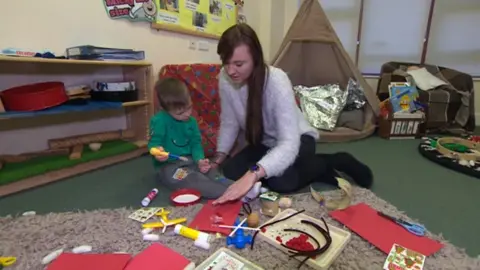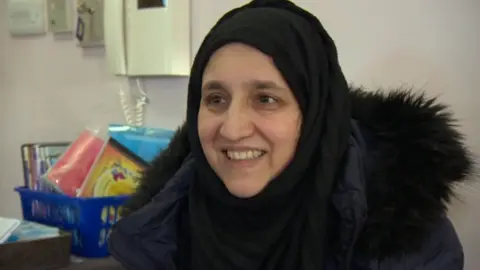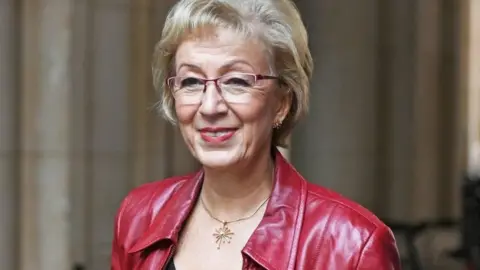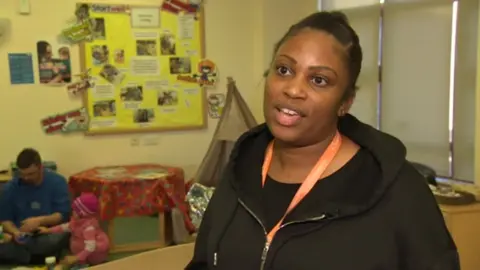Concern at decline of West Midlands children's centres
 BBC
BBCMore than half of council-run children's centres the West Midlands have closed in the past decade, figures reveal.
Some shut completely while others have seen services reduced or been repurposed by schools, private nurseries or charities.
For families who use the Lakeside Children's Centre in Erdington they told me it is a lifeline.
This part of Birmingham has some of the most disadvantaged streets in the city.
Mum-of-four Seema Anayat brings her youngest son to the centre since the ones closer to her home have now closed.
But a decade ago, when she had her first daughter, it was her local centre where she found support.
"At that time I was new in the UK, I had no family here, I don't know anyone but I saw different people [at the centre]," she said.
"They held classes for the mums and I took classes to learn English. From this environment I know what is healthy for my children."

Freedom of Information requests to local authorities in Birmingham, the Black Country, Coventry and Solihull show in 2010 there were 189 council-run centres, but only 75 remained by 2021.
Many English councils closed centres during this period as a result of large reductions to local authority funding after 2010.
A well-supported local campaign saved the Lakeside itself from being shut in 2017-18 under city council plans.
In 2020, then Prime Minister Boris Johnson asked former cabinet minister Andrea Leadsom to lead a review into early years provision.
In an interview with BBC Midlands Today, Ms Leadsom said early years support was "critical to levelling-up… the absolute talent in our country is equal but the opportunities are not and nowhere is that more the case than with new babies".
Her report made a series of recommendations including "family hubs" - centres where parents could access a range of services - and then-Chancellor Rishi Sunak pledged £300m for the scheme.
 PA Media
PA MediaBirmingham, Coventry, Dudley, Sandwell, Walsall, Wolverhampton, Stoke on Trent and Telford are among 75 pilot areas in England.
However, given the current economic climate, some are unsure about the government's long-term commitment.
The Conservative leader of one Midlands council told me: "We know prevention is absolutely key, so it's good, but the government don't seem to have their eye on children's services in the way they ought to… are they committed?"
In December, as council officers were asked by ministers to submit detailed plans for proposed family hub spending, an official with years of experience in children's services spoke to me.
"We welcome the money, and the focus, but we have no certainty beyond the first three years of funding," they said.
"It would be good to know where we are going. With things as they are, we're now facing other non-statutory [children's] services being cut. Again."
Ms Leadsom, who remains the government's Early Years Healthy Development Advisor, said the policy was supported by Boris Johnson, Liz Truss and the current PM and, with cross-party support, the time had come for a focus on early years provision.
"I'm going nowhere and I'm absolutely determined that at the time of the next comprehensive spending review we will continue to fund this fantastic investment," she said.

The government's political opponents argue it will be difficult to repair the damage caused by the closure of many children's centres over the past decade.
Tom McNeil, the Assistant Police and Crime Commissioner for the West Midlands, said he thought the closures had had a negative impact.
"We believe [the closures] have contributed to a rise in youth violence, and will continue to contribute to it," he said.
"Issues like domestic abuse, mental ill-health and poverty can result in issues with child development and people being drawn into gangs and criminality."
With the first tranche of Family Hub Funding due to be delivered this spring, Keshia Bedward - an early years outreach worker at the Lakeside Centre - summed up what parents, politicians, researchers, and staff all seem to agree on.
"The early years, under five, that's the most important time [for children]," she said.
When there were troubles, she added, "what matters is getting in there as early as possible to save it from escalating to anything much worse later on".

Follow BBC West Midlands on Facebook, Twitter and Instagram. Send your story ideas to: [email protected]
